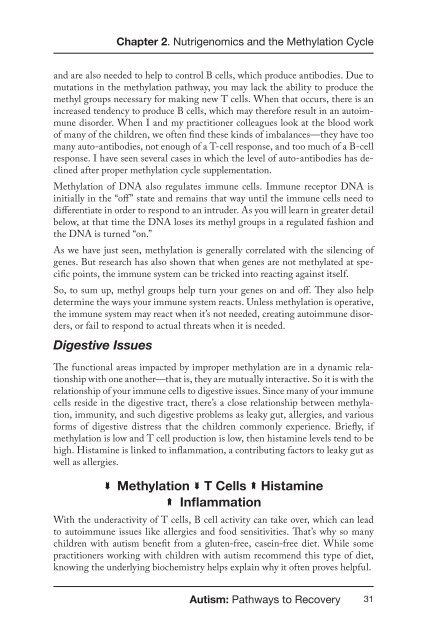3dT4E4Rnm
3dT4E4Rnm
3dT4E4Rnm
Create successful ePaper yourself
Turn your PDF publications into a flip-book with our unique Google optimized e-Paper software.
Chapter 2. Nutrigenomics and the Methylation Cycle<br />
and are also needed to help to control B cells, which produce antibodies. Due to<br />
mutations in the methylation pathway, you may lack the ability to produce the<br />
methyl groups necessary for making new T cells. When that occurs, there is an<br />
increased tendency to produce B cells, which may therefore result in an autoimmune<br />
disorder. When I and my practitioner colleagues look at the blood work<br />
of many of the children, we often find these kinds of imbalances—they have too<br />
many auto-antibodies, not enough of a T-cell response, and too much of a B-cell<br />
response. I have seen several cases in which the level of auto-antibodies has declined<br />
after proper methylation cycle supplementation.<br />
Methylation of DNA also regulates immune cells. Immune receptor DNA is<br />
initially in the “off” state and remains that way until the immune cells need to<br />
differentiate in order to respond to an intruder. As you will learn in greater detail<br />
below, at that time the DNA loses its methyl groups in a regulated fashion and<br />
the DNA is turned “on.”<br />
As we have just seen, methylation is generally correlated with the silencing of<br />
genes. But research has also shown that when genes are not methylated at specific<br />
points, the immune system can be tricked into reacting against itself.<br />
So, to sum up, methyl groups help turn your genes on and off. They also help<br />
determine the ways your immune system reacts. Unless methylation is operative,<br />
the immune system may react when it’s not needed, creating autoimmune disorders,<br />
or fail to respond to actual threats when it is needed.<br />
Digestive Issues<br />
The functional areas impacted by improper methylation are in a dynamic relationship<br />
with one another—that is, they are mutually interactive. So it is with the<br />
relationship of your immune cells to digestive issues. Since many of your immune<br />
cells reside in the digestive tract, there’s a close relationship between methylation,<br />
immunity, and such digestive problems as leaky gut, allergies, and various<br />
forms of digestive distress that the children commonly experience. Briefly, if<br />
methylation is low and T cell production is low, then histamine levels tend to be<br />
high. Histamine is linked to inflammation, a contributing factors to leaky gut as<br />
well as allergies.<br />
Methylation T Cells Histamine<br />
Inflammation<br />
With the underactivity of T cells, B cell activity can take over, which can lead<br />
to autoimmune issues like allergies and food sensitivities. That’s why so many<br />
children with autism benefit from a gluten-free, casein-free diet. While some<br />
practitioners working with children with autism recommend this type of diet,<br />
knowing the underlying biochemistry helps explain why it often proves helpful.<br />
Autism: Pathways to Recovery<br />
31


